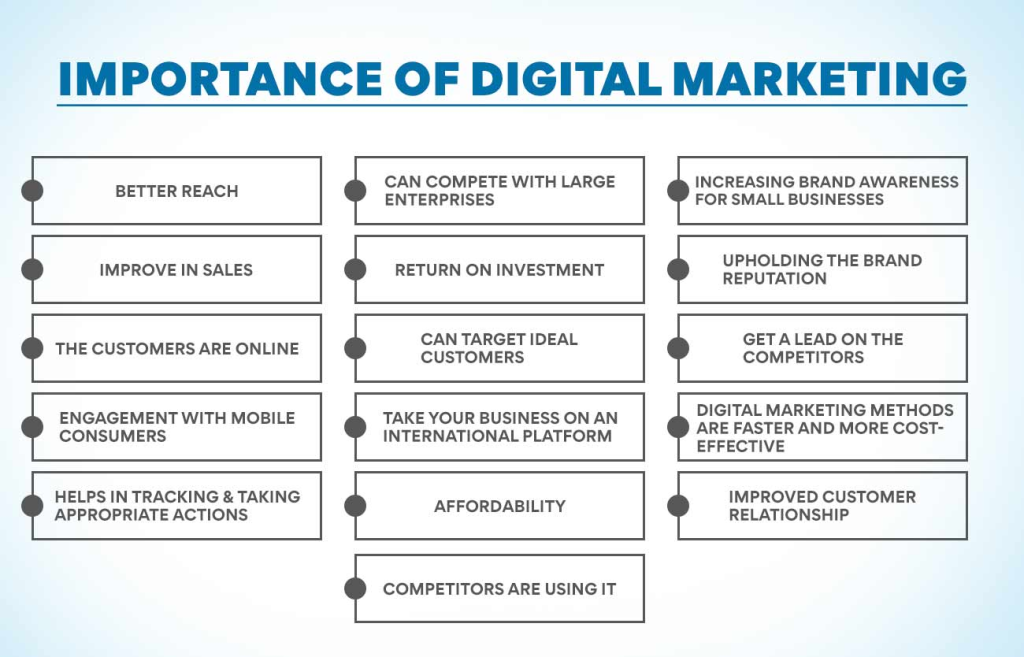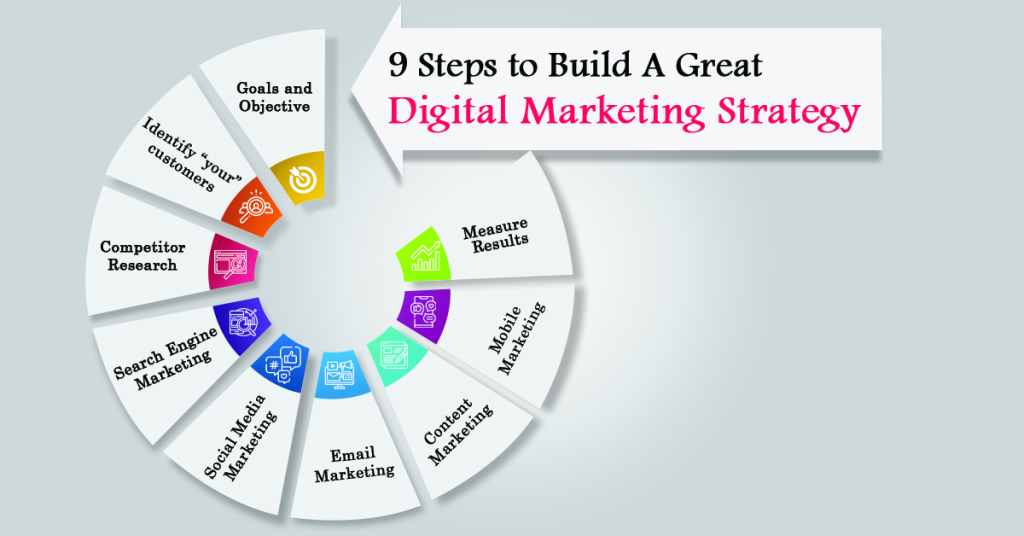
The significance of digital marketing in today’s business landscape pertains to the crucial role that online strategies and techniques play in the growth and promotion of businesses in the digital age. Digital marketing utilizes a range of digital channels and platforms, including websites, social media, search engines, email, and mobile apps, to effectively reach and engage with a broader audience. It enables businesses to precisely target and connect with potential customers, enhance brand awareness, drive website traffic, generate leads, and ultimately enhance sales and revenue. In a world where individuals are increasingly connected online, digital marketing offers a potent opportunity for businesses to remain competitive, expand their reach, and adapt to the evolving consumer behaviors and preferences in the digital domain.
Digital Marketing

Digital marketing refers to the utilization of diverse online channels, platforms, and strategies to promote products, services, and brands. It involves harnessing the power of the internet, mobile devices, social media, search engines, email, and other digital mediums to connect and engage with a specific target audience. Digital marketing encompasses a wide array of activities, including optimizing websites, employing search engine marketing (SEM) techniques, implementing search engine optimization (SEO) strategies, creating and distributing content, utilizing social media platforms, conducting email marketing campaigns, running online advertisements, and analyzing data for insights. Its primary goal is to enable businesses to establish connections with potential customers, enhance brand visibility, drive website traffic, generate leads, and ultimately achieve their marketing and business objectives in the digital landscape.
Importance of Digital Marketing for the Success of a Business

Digital marketing plays a pivotal role in the success of a business. In today’s digitally connected world, consumers heavily rely on the internet and digital platforms to discover, research, and make purchasing decisions. Here are some key reasons why digital marketing is of utmost importance for business success:
- Expanded Reach: Digital marketing empowers businesses to extend their reach beyond geographical boundaries and tap into a global audience. With online channels like websites, social media, and search engines, businesses can connect with potential customers worldwide.
- Targeted Marketing: Digital marketing enables businesses to precisely target their marketing efforts. Through techniques such as search engine optimization (SEO), pay-per-click (PPC) advertising, and social media targeting, businesses can deliver tailored messages to specific demographics, interests, and behaviors, ensuring their marketing campaigns reach the right audience.
- Cost-Effectiveness: Compared to traditional marketing methods, digital marketing often offers a more cost-effective solution. Businesses can achieve a wider reach and generate leads with a smaller budget by leveraging digital platforms, making it particularly advantageous for small and medium-sized enterprises.
- Measurable Results: One of the significant advantages of digital marketing is its ability to provide measurable results. Analytics tools and platforms allow businesses to track and analyze various metrics, such as website traffic, conversion rates, engagement levels, and return on investment (ROI). This data-driven approach enables businesses to assess the effectiveness of their marketing campaigns and make informed decisions to optimize their strategies for better outcomes.
- Brand Building and Awareness: Digital marketing provides ample opportunities for businesses to establish and strengthen their brand presence online. Through consistent branding, compelling content, active social media engagement, and positive customer experiences, businesses can enhance brand awareness and forge meaningful connections with their target audience.
- Customer Engagement: Digital marketing facilitates real-time customer engagement. Platforms like social media, email marketing, and live chat enable businesses to interact with their customers, address queries, provide support, and cultivate long-lasting relationships. This engagement fosters customer loyalty and satisfaction.
- Adaptability and Flexibility: The digital marketing landscape is dynamic and constantly evolving. Businesses that embrace digital marketing can swiftly adapt to changes, experiment with new strategies, and stay ahead of the competition. The flexibility of digital marketing allows businesses to adjust their campaigns based on real-time data and market trends.
In summary, digital marketing is a vital component for business success in the modern era. It offers opportunities for businesses to expand their reach, precisely target their marketing efforts, achieve cost efficiencies, measure campaign performance, build brand awareness, engage with customers, and stay adaptable in an ever-changing marketplace. Embracing digital marketing is no longer a choice but a necessity for businesses to thrive and prosper in today’s business landscape.
Why Digital Marketing Matters?

Digital marketing is of paramount importance for several reasons:
- Online Presence: Digital marketing allows businesses to establish a strong and visible presence in the online realm. In today’s digital age, where consumers are increasingly active on the internet, having a robust digital presence is essential for businesses to be discovered, recognized, and considered by potential customers.
- Targeted Audience: One of the key benefits of digital marketing is the ability to precisely target specific audience segments. By utilizing various online channels and tools, businesses can effectively reach the right individuals with tailored messages at the most opportune moments. This targeted approach significantly increases the chances of generating leads, conversions, and sales.
- Cost-Effectiveness: Compared to traditional marketing methods, digital marketing offers a more cost-effective solution. Online advertising, for instance, can be tailored to fit any budget and allows businesses to reach a larger audience without the high costs associated with traditional advertising channels.
- Measurable Results: Digital marketing provides the advantage of real-time measurement and analysis of marketing campaign performance. Through a wide range of analytics tools and platforms, businesses can obtain detailed insights into key metrics such as website traffic, conversions, click-through rates, and customer engagement. This data-driven approach enables businesses to understand what works and make informed decisions to optimize their marketing strategies.
- Brand Building and Awareness: Digital marketing plays a vital role in building and enhancing brand awareness. By leveraging social media, content marketing, and other online tactics, businesses can create and distribute valuable and engaging content that resonates with their target audience. This helps establish brand authority, credibility, and recognition in the digital landscape.
- Customer Engagement: Digital marketing facilitates direct engagement and interaction with customers. Social media platforms, email marketing, live chat, and online communities provide channels for businesses to connect with their audience, address inquiries, gather feedback, and provide personalized customer experiences. This engagement fosters customer loyalty and strengthens relationships.
- Competitive Advantage: Embracing digital marketing provides businesses with a competitive edge. With a growing number of consumers conducting online research before making purchasing decisions, a strong online presence allows businesses to meet customer expectations, outshine competitors, and capture market share in the digital realm.
- Flexibility and Adaptability: Digital marketing enables businesses to adapt and adjust their strategies quickly. With the dynamic nature of the digital landscape, businesses can experiment, test, and optimize campaigns in real-time. This flexibility empowers businesses to respond effectively to market changes, consumer trends, and competitor activities.
In conclusion, digital marketing holds significant importance as it helps businesses establish a visible online presence, target the right audience, achieve cost efficiencies, measure results, build brand awareness, engage with customers, gain a competitive advantage, and adapt to the ever-evolving digital landscape. It is an integral component of a successful marketing strategy in today’s digitally driven business environment.
The History of Digital Marketing

The history of digital marketing can be traced back to the early 1990s when the internet started to gain popularity among the general public. Since then, digital marketing has evolved significantly. Here’s a brief overview of the key milestones and developments:
- Emergence of the Internet: In the 1990s, the internet became accessible to the public, leading to the rapid growth of websites and email. This created new opportunities for businesses to reach a wider audience through digital channels.
- Search Engine Optimization (SEO): As search engines gained prominence, businesses realized the importance of appearing in search results. SEO techniques emerged to optimize websites and improve their visibility and rankings on search engine pages.
- Banner Ads and Display Advertising: In the mid-1990s, banner ads started appearing on websites. This form of online advertising involved displaying graphical ads to promote products and services.
- Pay-Per-Click (PPC) Advertising: In 1998, the concept of PPC advertising was introduced. It allowed advertisers to pay only when their ads were clicked, offering a more cost-effective and targeted approach to online advertising.
- Social Media Marketing: With the rise of social media platforms like MySpace, Facebook, and Twitter in the mid-2000s, businesses began utilizing these platforms to connect with their audience, build brand awareness, and run targeted advertising campaigns.
- Content Marketing and Blogging: In the early 2000s, content marketing and blogging gained traction. Businesses started creating valuable content to engage their target audience and establish themselves as thought leaders in their respective industries.
- Mobile Marketing: The advent of smartphones and mobile internet in the late 2000s transformed digital marketing. Businesses started optimizing their websites for mobile devices and leveraging mobile advertising, apps, and SMS marketing to reach consumers on the go.
- Rise of Video Marketing: The popularity of platforms like YouTube brought about the rise of video marketing. Brands began creating and sharing video content to engage and entertain their audience in a more interactive and visual way.
- Personalization and Targeting: With advancements in data analytics and tracking technologies, businesses started leveraging user data to deliver personalized and targeted marketing messages to individual users, enhancing the relevancy and effectiveness of their campaigns.
- Influencer Marketing: Influencer marketing gained prominence as brands began collaborating with popular social media influencers to promote their products and services to their engaged followers.
- Marketing Automation and Customer Relationship Management (CRM): Marketing automation platforms and CRM systems became essential tools for managing and automating digital marketing campaigns, nurturing leads, and improving customer relationships.
- Artificial Intelligence (AI) and Machine Learning (ML): The integration of AI and ML into digital marketing brought about new capabilities, including data analysis, chatbots, recommendation engines, and personalized customer experiences.
The history of digital marketing continues to evolve rapidly as technology advances and consumer behavior changes. Today, businesses have access to a wide range of digital marketing strategies, channels, and technologies to connect with their target audience in the ever-expanding digital landscape.
Steps To Build the Digital Marketing Strategy

Developing an effective digital marketing strategy involves several key steps. Here’s a guide to building a comprehensive digital marketing strategy:
- Define Objectives: Clearly outline your marketing goals and objectives. Determine what you aim to achieve, whether it’s increasing brand awareness, driving website traffic, generating leads, boosting sales, or improving customer engagement. Well-defined objectives will guide your strategy and help measure success.
- Identify Your Target Audience: Gain a deep understanding of your target audience. Analyze their demographics, interests, behaviors, and pain points. This information will shape your messaging and enable you to choose the most effective channels and tactics to reach and engage your audience.
- Conduct Market Research: Conduct thorough research on your industry, competitors, and market trends. Identify opportunities, challenges, and unique selling points that can set your brand apart. Market research will inform your positioning and overall marketing approach.
- Establish Key Performance Indicators (KPIs): Determine the key metrics that will measure the success of your digital marketing efforts. This may include website traffic, conversions, click-through rates, social media engagement, or return on investment. Clear KPIs will enable you to track progress and make data-driven decisions.
- Select Relevant Digital Channels: Choose the digital channels that align with your target audience and objectives. This may involve search engine optimization (SEO), pay-per-click (PPC) advertising, social media marketing, email marketing, content marketing, influencer marketing, or a combination of these. Focus on channels that offer the best opportunities for reaching and engaging your target audience.
- Create Compelling Content: Develop valuable and relevant content that resonates with your target audience. This can include blog articles, videos, infographics, ebooks, case studies, and social media posts. Tailor your content to address customer pain points, provide solutions, and demonstrate your expertise.
- Optimize for Search Engines: Implement SEO strategies to improve your website’s visibility in search engine results. Conduct keyword research, optimize your website structure and content, and build high-quality backlinks to increase organic traffic.
- Leverage Paid Advertising: Consider running targeted PPC campaigns on platforms such as Google Ads or social media advertising. Set a budget, define your target audience, create compelling ad copies, and closely monitor campaign performance to maximize your return on investment.
- Utilize Social Media: Establish a strong social media presence on platforms that align with your audience. Create engaging content, actively interact with your followers, and leverage social media advertising to expand your reach.
- Monitor and Analyze Results: Continuously monitor your digital marketing efforts and analyze the results. Utilize analytics tools to track key metrics, gain insights into customer behavior, and identify areas for improvement. Use the data to optimize your strategy and maximize performance.
- Test and Refine: Embrace a culture of testing and experimentation. Continuously test different strategies, channels, messaging, and creative elements. Learn from the results, both successes, and failures, and refine your approach to achieve better outcomes.
- Stay Updated: Stay abreast of the latest digital marketing trends, technologies, and best practices. The digital landscape evolves rapidly, so it’s important to remain updated to remain competitive and capitalize on new opportunities.
Remember, creating a digital marketing strategy is an ongoing process. Regularly review and refine your strategy based on market dynamics, customer feedback, and evolving business goals to ensure its effectiveness and drive continuous growth.






Leave a Reply
You must be logged in to post a comment.